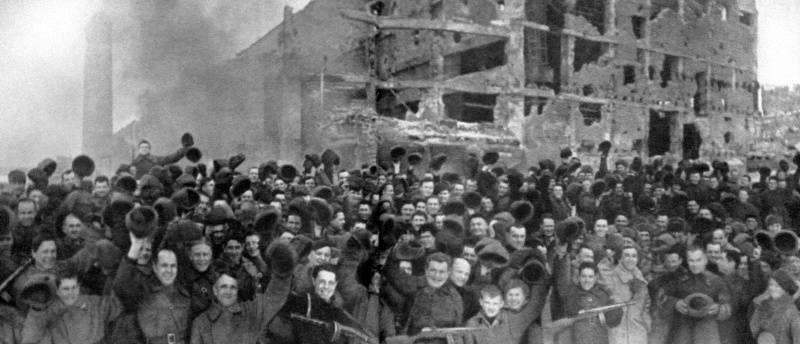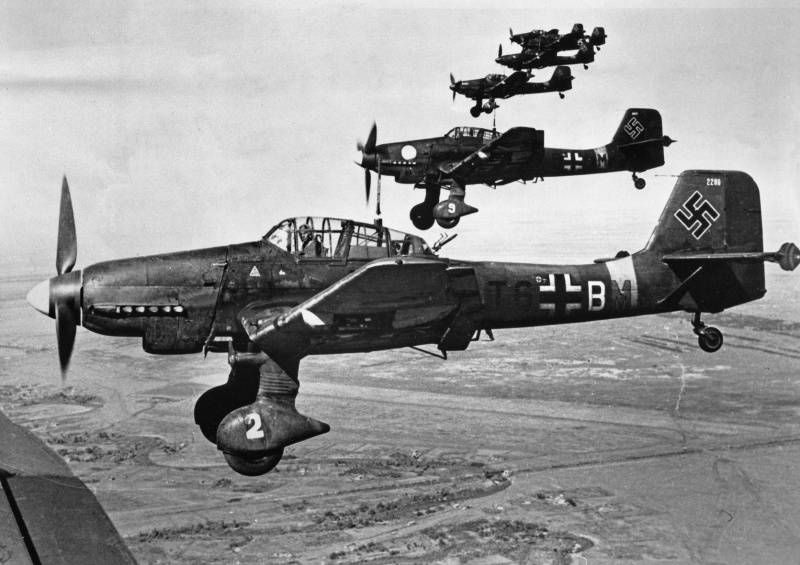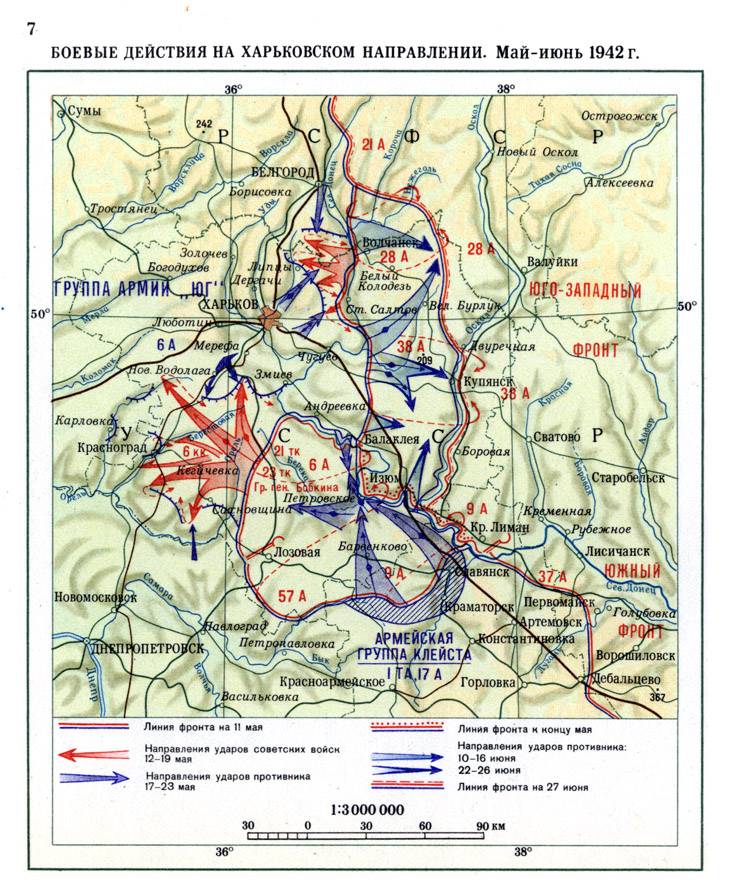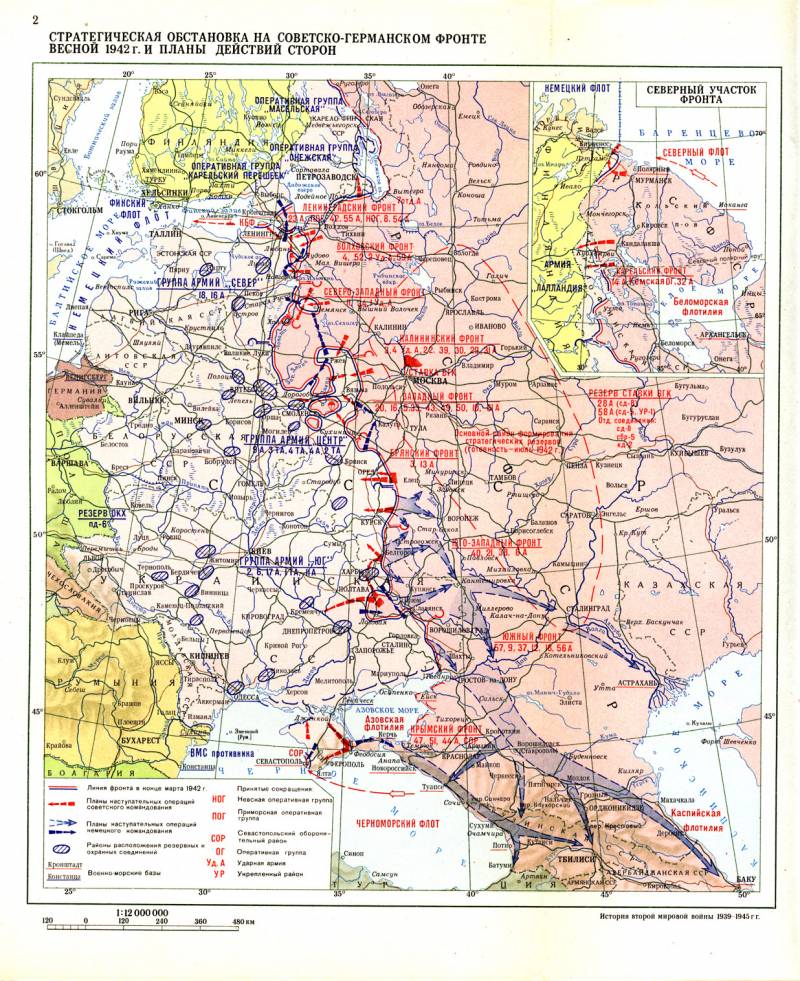Victory Day in the Battle of Stalingrad

February 2 celebrates one of the days of military glory in Russia - the Day of the defeat of the German troops by the Soviet troops in the Battle of Stalingrad. On that day, the remaining German troops capitulated near Stalingrad. The battle of Stalingrad ended in complete victory for the Red Army. The crushing defeat of the German army in the southern strategic direction was a major turning point in the Great Patriotic War and in the entire Second World War. The strategic initiative began to move to the Soviet armed forces.
Strategic situation on the eve of battle
The international situation in 1942 was difficult. Germany and its allies, retained a strategic initiative and, possessing tremendous combat power, continued aggression. On the other hand, the process of uniting the forces of the anti-Hitler coalition continued. January 1 The Washington 1942 Declaration was adopted by 26 countries, including the world's leading powers (USSR, USA, UK and China). The states that signed the declaration pledged to use all their resources in the fight against the powers of the German bloc and not enter into a separate peace with them.
However, the problem was that the owners of London and Washington were not in a hurry to get involved decisively in a battle in Europe. The USA and Great Britain, who were the real instigators of the war in order to crush Russia, Germany, Japan and establish the Anglo-Saxon world order, waited for the USSR and Germany to be exhausted in the titanic battle that they fought with each other, and they would receive all the fruits of victory (As the masters of the West unleashed World War II; World War II - a terrible blow to the USA and England in Russia, Germany and Japan).
At the end of December 1941, Anglo-American negotiations on the strategy of war began in Washington. Roosevelt, Churchill, and the chiefs of staff of the armed forces of the two great powers participated in the conference. The initiative in the negotiations belonged to the British, who are well prepared for them. The British believed that the key challenge for the 1942 year was the conquest of North West Africa. This plan was the practical embodiment of the English military doctrine of the "strategy of indirect action." The British believed that the decisive battles against Germany should begin only after the exhaustion of the enemy’s forces as a result of the blockade, air strikes and operations in secondary directions. The proposed British strategy was approved in Washington.
Thus, instead of focusing on the main strategic direction by opening a second front in Western Europe with the goal of quickly ending the war, Britain and the United States dispersed forces in secondary theaters of war: in North Africa, in the Middle East, etc. Even serious successes in these areas could not lead to victory over Germany, as they were far from its vital centers. Therefore, these operations could not provide serious assistance to the USSR, bearing the main burden of war. Germany could still concentrate its main efforts to fight the Soviet Union.
In Washington, it was understood that Germany could be defeated only by invading Europe. The invasion was scheduled for 1943. Moreover, in the event of a sharp deterioration in the situation on the Soviet-German front in 1942, or, conversely, a critical weakening of Germany, it was proposed in the autumn of 1942 to carry out an “early” invasion of the Allied forces in France. In London, they supported this plan, but Churchill and other British leaders did not abandon their previous installations for waging war. With sufficient forces to deploy operations in Europe and a huge fleet, Americans and British delayed the moment of opening of the second front to the last moment. Thus, the production of aircraft in the United States by August 1942 exceeded the production of aircraft in Germany, Italy and Japan combined. England by the end of this year in aircraft production overtook Germany, and in production tanks almost caught up with her. The masters of the United States and England were interested in the battle of annihilation waged by the Russians and Germans. Bloodless Germany and Russia-the USSR, according to the plans of the masters of the West, could no longer prevent the construction of a new world order led by the United States. All this determined the strategy of delaying the war, consistently pursued by the United States and Britain during the Second World War. Germany got the opportunity during the 1942 campaign of the year to organize a new decisive offensive against the USSR.

German Junkers U-87 dive bombers from the 2 th dive bomber squadron in the Stalingrad area
Germany. The intentions of the German leadership
The defeat of the Wehrmacht near Moscow and the successful counter-offensive of the Red Army in the winter of 1941-1942. dealt a serious blow to the plans of the German military and political leadership. Doubts covered the German people and the army. The report of the security service of the Third Reich in January 1942 noted: “The German people are very concerned about the situation on the Eastern Front. A huge number of frostbite, which arrived in echelons to their homeland, excites strong indignation among the population. Supreme Command bid summaries are subject to criticism because they do not paint a clear picture of the situation. The fact that our soldiers are writing from front to home cannot be imagined at all. ” In the top of the Wehrmacht, opposition, conspiratorial sentiments again resumed. Senior officers discussed the plan to overthrow Hitler. But later, when the German troops resumed the offensive, this opposition stalled for a while.
As a result, in order to restore the shaken prestige of the “invincible” Wehrmacht, the National Socialist Party and the state aimed all means of propaganda. The Germans were inspired that the defeat near Moscow was random and was caused mainly by the weather conditions of the harsh Russian winter. Thus was born the myth of the "Russian winter" as the main factor in the defeat of the Wehrmacht. The idea of the racial superiority of the German nation and the invincibility of the Wehrmacht were promoted with new force. In general, German propaganda managed to convince the majority of the population that the defeat in the East is a temporary phenomenon caused by the harsh Russian nature and the mistakes of individual generals. At the same time, terror against any manifestations of anti-war and anti-Nazi sentiments intensified. Only in the territory of the Third Reich at that time there were 15 large concentration camps, in which there were simultaneously 130 thousand people. There is a maximum concentration of power Fuhrer. In April, the Reichstag 1942 recognized the unrestricted rights of the Fuhrer, adopting the relevant law. All legislative and executive powers were handed over to Hitler, who acted as the leader of the people, the supreme commander-in-chief of the armed forces, the head of state and party. The Reichstag ceased to function even nominally.
The failure of the “blitzkrieg” plans forced Berlin to switch to the concept of a protracted war. This required additional mobilization of human resources for the front and expansion of military production. The addition of the Wehrmacht personnel was accompanied by a reduction in the number of workers in the economy of the country. This led to an increase in the use of bonded labor by foreign workers, Ostarbeiters and prisoners of war. The General Commissioner for the Use of Labor F. Zaukel organized on an enormous scale forced displacement of the population, mostly young, from the occupied countries to Germany. Especially rampant by the Nazis in the captured Soviet lands. As a result, the number of German workers in the Reich economy during the period from 1941 to 1942 decreased from 33,4 million to 31,5 million, and the number of foreign workers and prisoners of war in it increased from 3 million to 7 million.
In February, 1942, Albert Speer (after Todt’s death) was appointed Minister of Weapons and Ammunition. The direct participation of representatives of large monopolies in the management of the economy increased even more. Decisive measures were taken to increase the output of military products: the working hours of military enterprises increased, the production of consumer goods sharply decreased. They began to make more active use of the production and human resources of the occupied countries of Europe, neutral countries (Turkey, Sweden, Spain, Switzerland, etc.) also contributed to the growth of the Reich military power. As a result, the Nazis achieved a serious increase in military production, which allowed the Wehrmacht to be supplied with the necessary weapons and military materials. By July 1942, compared with February of the same year, the level of military production increased by 55%. In the first place was still the production of offensive weapons and ammunition. If 1941 produced 12,4 thous. Aircraft, then 1942 made 15,4 thous. (Growth in 24%); in 1941, 5,2, thousand tanks, in 1942, 9,3, thousand (growth 79%); in 1941 - 7 thousand guns of caliber over 75 mm, in 1942 - 12 thousand (growth in 70%). At the same time they began to produce mainly medium tanks (T-3, T-4).
By the spring of 1939, the German Empire had in its armed forces 239 divisions and 5 brigades, which recited 8,6 million people. The overwhelming majority of these troops were on the Russian front: 182 divisions and 4 brigades. In addition, the Allies of Germany were to send troops to the Eastern Front: Romania - two armies as part of the 20 divisions, Hungary - one army as part of the 12 divisions, Italy - one army as part of the 7-8 divisions. Finland fought against the USSR. The Red Army in May 1942 was opposed by German troops and its allies, numbering 6,2 million, up to 43 thousand guns and mortars, about 3230 tanks and SAU, 3400 aircraft. True, the Wehrmacht’s combat effectiveness was fully restored after the 1941-1942 winter campaign. failed. Incomplete ground forces amounted to 625 thousand people.
The USSR Armed Forces, despite catastrophic defeats and huge losses, increased their combat capability and strengthened their material base. A powerful military and economic base, created in the pre-war years and a great spiritual ascent of the people, had an effect. By the second summer campaign in the army there were 5,5 million people, 43,6 thousand guns and mortars, 1220 rocket launchers, more than 4 thousand tanks, over 3100 aircraft. However, the position of the Red Army was complicated by the fact that Moscow could not concentrate all its forces and resources on the western strategic direction. A powerful grouping had to be held in the east of the country, since Japan maintained a strong strike force in Manchuria (the Kwantung Army). Turkey was also hostile towards the USSR. At the Soviet border was concentrated the Turkish army as part of the 28 divisions, which could invade Soviet territory in the event of a sharp deterioration in the situation on the Soviet-German front. This forced Moscow to strengthen the defense of the Transcaucasus.
The German military-political leadership still maintained confidence in the superiority of the Wehrmacht over the Red Army and in the final victory. However, in Berlin, certain lessons were learned from the failure of the “blinding” war in 1941. The German headquarters saw the impossibility to conduct a decisive offensive during the campaign simultaneously all along the Eastern Front. It was decided to attack in one strategic direction. However, the Chief of the General Staff of the Ground Forces Halder, like some other generals, doubted that the USSR could be broken by attacking in only one strategic direction. Some believed that in the East it was necessary to move on to strategic defense, while preserving vast territories already captured. But no one dared to tell Hitler about this. In addition, the German command did not want to give the initiative to the enemy. Therefore, they decided to make another attempt at a decisive offensive in the German bet, despite all doubts.
The German elite still overestimated its capabilities and underestimated the enemy. Adolf Hitler 15 March declared that during the summer of 1942, the Russian army would be completely destroyed. True, now not all German generals believed in the success of the offensive. But still, like Hitler, they considered it necessary to advance until Britain and the United States opened a second front in Western Europe. “In the spring of 1942,” wrote G. Guderian further, “the German high command faced the question of what form to continue the war: to advance or to defend? The transition to defense would be a recognition of our own defeat in the 1941 campaign and would deprive us of the chances for a successful continuation and end of the war in the East and in the West. 1942 year was the last year in which, without fear of the immediate intervention of the Western powers, the main forces of the German army could be used in the offensive on the Eastern Front. It remained to decide what should be undertaken at the front with a length of 3 thousand km in order to ensure success to the offensive conducted by relatively small forces. It was clear that on most of the front, the troops had to go on the defensive ... ". In this way, The German elite was confident that in 1942, the British and Americans would provide them with a calm rear and they could strike the USSR with all their strength, as in 1941.
Hitler ordered the main efforts of the Wehrmacht in the summer of 1942, to direct south to capture the Caucasus. The Germans planned in successive operations in parts to crush the Soviet forces opposing them. The seizure of the Caucasus was important from the point of view of strategy and economy, and also led the Wehrmacht to Turkey, which should have forced the Turkish leadership to start a war with the USSR. In addition, the Nazis received a strategic base for operations in the Middle East, and access to the Persian Gulf and India, as Hitler dreamed. The campaign plan for 1942 was set forth in Directive No. 41 of the German Supreme Command 5 on April 1942. It stated that the offensive’s goal was to “permanently destroy the remaining forces at the disposal of the Soviets and deprive them of the most important military forces -economic centers. At the same time, simultaneous strikes were planned at Stalingrad and the Caucasus. General Halder believed that a simultaneous offensive in two strategic directions - Stalingrad and Caucasus - is not supported by the available forces. He suggested that the main forces be thrown at a quick capture of Stalingrad by carrying out an offensive with mobile units, and Army Group A was to provide the southern flank of the attack force and expand the front breakthrough.
June 1 Hitler flew to Poltava, he held a meeting with senior military leadership. The Fuhrer approved all plans and calculations. Unlike the Barbarossa plan, the main goal of the offensive of the Wehrmacht was no longer based on the strategy of the “blitzkrieg” war. Directive No. 41 did not fix the chronological framework of the campaign. The Germans planned, keeping their positions in the central direction, to smash and destroy the Soviet troops in the Voronezh region and west of the Don, to capture the southern regions of the USSR rich in strategic raw materials. First of all, Hitler decided to seize the Caucasus with its sources of oil, the agricultural regions of the Don, Kuban and the North Caucasus. Success in the Stalingrad sector was supposed to lead to a lasting conquest of the Caucasus. To solve this problem, it was planned to conduct a series of successive operations in the Crimea, south of Kharkov, and then in the Voronezh, Stalingrad and Caucasus directions. The operation to seize Leningrad and establish a land connection with Finland was made dependent on the solution of the main task in the south. Army Group "Center" at this time was supposed to improve its operational position by conducting private operations.
Position of the USSR
For the Soviet Union, the situation at the front by the spring of 1942 was difficult. The winter offensive of the Red Army already stalled in March. Soviet troops went on the defensive. The Headquarters and the General Staff, proceeding from the fact that the most powerful enemy grouping of more than 70 divisions remained in the central (Moscow) strategic direction, concluded that the main struggle in the summer again will unfold for Moscow. A new decisive blow of the enemy was expected here. The Soviet high command predicted that the enemy would launch a new decisive offensive in the summer of 1942. It was also taken into account that with a shortage of large prepared reserves and aviation large offensive operations are impractical. The General Staff drew up a plan: its basis was active strategic defense, the accumulation of reserves, and then the transition to a decisive offensive.
Thus, the plan was based on a temporary strategic defense, and planned to move to a decisive offensive only after exhausting the enemy’s forces. At the end of March, the General Headquarters agreed with the proposals of the General Staff and adopted this plan. However, it was envisaged to conduct private attacks in a number of areas: near Leningrad, in the area of Demyansk, in Smolensk, in the Kharkov region, in the Crimea, etc. Private operations were supposed to consolidate previous successes, improve the operational position of our troops, thwart the enemy attack and create favorable conditions for a future decisive offensive on the entire front from the Baltic to the Black Sea. Expecting that the enemy would launch a decisive offensive on the Moscow direction, the headquarters concentrated strategic reserves in the areas of Tula, Voronezh, Stalingrad and Saratov.
In the spring of 1942, events at the front were unfavorable for the Red Army. An attempt by the Crimean front to launch an offensive on the Kerch Peninsula, for the liberation of the whole Crimea, despite the advantage in forces, failed. May 8 German troops struck a counterblow and May 14 broke through to Kerch. Soviet troops with heavy losses retreated to the Taman Peninsula. The loss of the Kerch Peninsula worsened the position of the Soviet troops in Sevastopol. 7 June began the third assault on Sevastopol. 30 June the Germans went directly to the city. By July 4, the Soviet fortress, after the 250-day defense, fell. The situation was difficult on other sectors of the front. In May, the troops of the North-Western Front attacked the forces of the Demyan grouping of the enemy, but did not succeed. The Volkhov group of the Leningrad Front unsuccessfully attempted to expand the bridgehead on the western bank of the Volkhov. German troops surrounded the 2 th shock army, most of it was killed or captured.
But the situation in the southern strategic direction has especially deteriorated. On May 12, the troops of the South-Western Front launched an offensive with the aim of defeating the German army 6 and Paul's liberation. With the successful development of the operation conditions should have arisen for the liberation of Donbass. Initially, the operation developed successfully, the Soviet troops broke through the enemy front, the German army 6 threw the last reserves into battle. However, 17 in May, the army group of General Kleist (1-I tank and 17-I armies) launched a counter-offensive from the area of Slavyansk, Kramatorsk. The Germans broke through the defenses of the Soviet Army 9. At the same time, the 6 of the German army also launched a counter-offensive. As a result, part of the forces of the Southern Front and the strike force of the South-Western Front fell into a difficult situation. In addition, the command of the Southwestern Direction and the Front (Commander S. K. Tymoshenko, member of the Military Council N. S. Khrushchev, Chief of Staff I. H. Baghramyan) underestimated the enemy forces and did not take timely measures to prevent an approaching catastrophe. The withdrawal of troops who were threatened with encirclement was delayed. 19 May the Germans went to the rear of the Soviet troops. Marshal Tymoshenko finally gave the order to stop the attack on Kharkov and throw the main forces to restore the situation on the Barvenkovsky ledge. But it was too late. 6-I and 57-I Soviet armies, as well as an army task force were surrounded. A smaller part of the troops led by divisional commissar K. A. Gurov managed to break through. The troops of the South-Western Front suffered heavy losses. Among the dead were the deputy front commander F. Ya. Kostenko, the commanders of the 57 and 6 armies K. P. Podlas and A. M. Gorodnyansky, the commander of the army group L. V. Bobkin. Thousands of Soviet soldiers were killed or captured.
The Kharkov operation was a huge tragedy that dramatically changed the situation on the southern wing of the Soviet-German front in favor of the enemy.

To be continued ...

Information